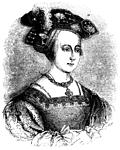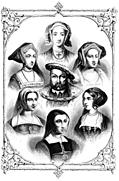Bolen, Anne
, second wife of king Henry VIII. was born in 1507. She was daughter of sir Thomas Bolen, afterwards earl of Wiltshire and Ormonde, by Elizabeth, daughter of Thomas Howard, duke of Norfolk. When she was but seven years of age, she was carried over to France with the king’s sister Mary, who was married to Lewis XII. And though, upon the B’rench king’s death, the queen dowager returned to England, yet Anne Bolen was so highly esteemed at the court of France, that Claude, the wife of Francis I. retained her in her service for some years; and after her death in 1524, the duchess of Alenzon, the king’s sister, kept her in her court during her stay in that kingdom. It is probable, that she returned from thence with her father, from his embassy in 1527; and was soon preferred to the place of maid of honour to the queen. She continued without the least imputation upon her character, till her unfortunate fall gave occasion to some malicious writers to defame her in all the parts of it. Upon her coming to the English court, the lord Percy, eldest son of the earl of Northumberland, being then a domestic of cardinal Wolsey, made his addressee to her, and proceeded so far, as to engage himself to marry her; and her consent shews, that she had then no aspirings to | the crown. But the cardinal, upon some private reasons, using threats and other methods, with great difficulty put an end to that nobleman’s design. It was prohably about 1528, that the king began to shew some favour to her, which caused many to believe, that the whole process with regard to his divorce from queen Catherine was moved by the unseen springs of that secret passion. But it is not reasonable to imagine, that the engagement of the king’s affec tion to any other person gave the rise to that affair; for so sagacious a courtier as Wolsey would have infallibly discovered it, and not have projected a marriage with the French king’s sister, as he did not long before, if he had seen his master prepossessed. The supposition is much more reasonable, that his majesty, conceiving himself in a manner discharged of his former marriage, gave a full liberty to his affections, which began to settle upon Mrs. Bolen; who, in September 1532, was created marchioness of Pembroke, in order that she might be raised by degrees to the height for which she was designed; and on the 25th of January following was married to the king, the office being performed by; Rowland Lee, afterwards bishop of Coventry and Lichfield, with great privacy, though in the presence of her uncle the duke of Norfolk, her father, mother, and brother. On the 1st of June, 1533, she was crowned queen of England with such pomp and solemnity, as was answerable to the magnificence of his majesty’s temper; and every one admired her conduct, who had so long managed the spirit of a king so violent, as neither to surfeit him with too much fondness, nor to provoke with too much reserve. Her being so soon with child gave hopes of a numerous issue; and those, who loved the reformation, entertained the greatest hopes from her protection, as they knew she favoured them. On the 13th or 14th of September following, she brought forth a daughter, christened Elizabeth, afterwards the renowned queen of England, Cranmer, archbishop of Canterb ry, being her god-father. But the year 1536 proved fatal to her majesty; and her ruin was in all probability occasioned by those who began to be distinguished by the name of the Romish party. For the king now proceeding both at home and abroad in the point of reformation, they found that the interest which the queen had in him was the grand support of that cause. She had risen, not only in his esteem, but likewise in that of the nation in general; for in the last nine months of | her life, she gave above fourteen thousand pounds to the poor, and was engaged in several noble and public designs. But these virtues could not secure her against the artifices of a bigoted party, which received an additional force from several other circumstances, that contributed to her destruction. Soon after queen Catharine’s death in Jan. 1535-6, she was brought to bed of a dead son, which was believed to have made a bad impression on the king’s mind; and as he had concluded from the death of his sons by his former queen, that the marriage was displeasing to God, so he might upon this misfortune begin to have the same opinion of his marriage with queen Anne. It was also considered by some courtiers, that now queen Catharine was dead, his majesty might marry another wife, and be fully reconciled with the pope and the emperor, and the issue by any other marriage would never be questioned; whereas, while queen Anne lived, the ground of the controversy still remained, and her marriage being accounted null from the beginning, would never be allowed by the court of Rome, or any of that party. With these reasons of state the king’s own passions too much concurred; for he now entertained a secret love for the lady Jane Seymour, who had all the charms of youth and beauty, and an humour tempered between the gravity of queen Catharine, and the gaiety of queen Anne. Her majesty therefore perceiving the alienation of the king’s heart, used all possible arts to recover that affection, the decay of which she was sensible of; but the success was quite contrary to what she designed. For he saw her no more with those eyes which she had formerly captivated; but gave way to jealousy, and ascribed her caresses to some other criminal passion, of which he began to suspect her. Her chearful temper indeed was not always limited within the bounds of exact decency and discretion; and her brother the lord Rochford’s wife, a woman of no virtue, being jealous of her husband and her, possessed the king with her own apprehensions. Henry Norris, groom of the stole, William Brereton, and sir Francis W’eston, who were of the king’s privy chamber, and Mark Smeton, a musician, were by the queen’s enemies thought too officious about her; and something was pretended to have been sworn by the lady Wingfield at her death, which determined the king; but the particulars are not known. It is reported likewise, that when the king held a tournament at Greenwich on the | 1st of May, 1536, he was displeased at the queen for letting her handkerchief fall to one, who was supposed a favourite, and who wiped his face with it. Whatever the case was, the king returned suddenly from Greenwich to Whitehall, and immediately ordered her to be confined to her chamber, and her brother, with the four persons abovementioned, to be committed to the Tower, and herself to be sent after them the day following. On the river some privy counsellors came to examine her, but she made deep protestations of her innocence; and as she landed at the Tower, she fell down on her knees, and prayed Heaven so to assist her, as she was free from the crimes laid to her charge.“The confusion she was in soon raised a storm of vapours within her; sometimes she laughejj, and at other times wept excessively. She was also devout and light by turns; one while she stood upon her vindication, and at other times confessed some indiscretions, which upon recollection she denied. All about her took advantage from any word, that fell from her, and sent it immediately to court. The duke of Norfolk and others, who came to examine her, the better to make discoveries, told her, that Morris and Smeton had accused her; which, though false, had this effect on her, that it induced her to own some slight acts of indiscretion, which, though no ways essential, totally alienated the king from her. Yet whether even these small acknowledgments were real truths, or the effects of imagination and hysterical emotions, is very uncertain. On the 12th of May, Morris, Brereton, Weston, and Smeton, were tried in Westminster-hall. Smeton is said by Dr. Burnet to have confessed the fact; but the lord Herbert’s silence in this matter imports him to have been of a different opinion; to which may be added, that Cromwell’s letter to the king takes notice, that only some circumstances were confessed by Smeton. However, they were all four found guilty, and executed on the 17th of May. On the 15th of which month, the queen, and her brother the lord Rochford, were tried by their peers in the Tower, and condemned to die. Yet all this did not satisfy the enraged king, who resolved likewise to illegitimate his daughter Elizabeth; and, in order to that, to annul his marriage with the queen, upon pretence of a precontract between her and the lord Percy, now earl of Northumberland, who solemnly denied it; though the queen was prevailed upon to acknowledge, that there were some | just and lawful impediments against her marriage with the king; and upon this a sentence of divorce was pronounced by the archbishop, and afterwards confirmed in the convocation and parliament. On the 19th of May, she was brought to a scaffold within the Tower, where she was prevailed upon, out of regard to her daughter, to make no reflections on the hardships she had sustained, nor to say any thing touching the grounds on which sentence passed against her; only she desired, that” all would judge the best." Her head being severed from her body, they were both put into an ordinary chest, and buried in the chapel in the Tower.
Her death was much lamented by many, as she had been an eminent patroness of men of learning and genius, and in all other respects of a most generous and charitable disposition; and it is highly probable, that, if she had lived, the vast sums of money, which were raised by the suppression of religious houses, would have been employed in the promotion of the most public and valuable purposes. 1
Birch’s Lives to Honbraken’s Heads.—Lodge’s Lives to Holbein’s ditto.— Burner’s Hist. of the Reformation.—Rapin, Hume, and Henry’s Hist. of England, &c.—Park’s edition of Walpole’s Royal and Noble Authors.





![[the book]](../../g/21R98TQH7QL._SL160_.jpg)